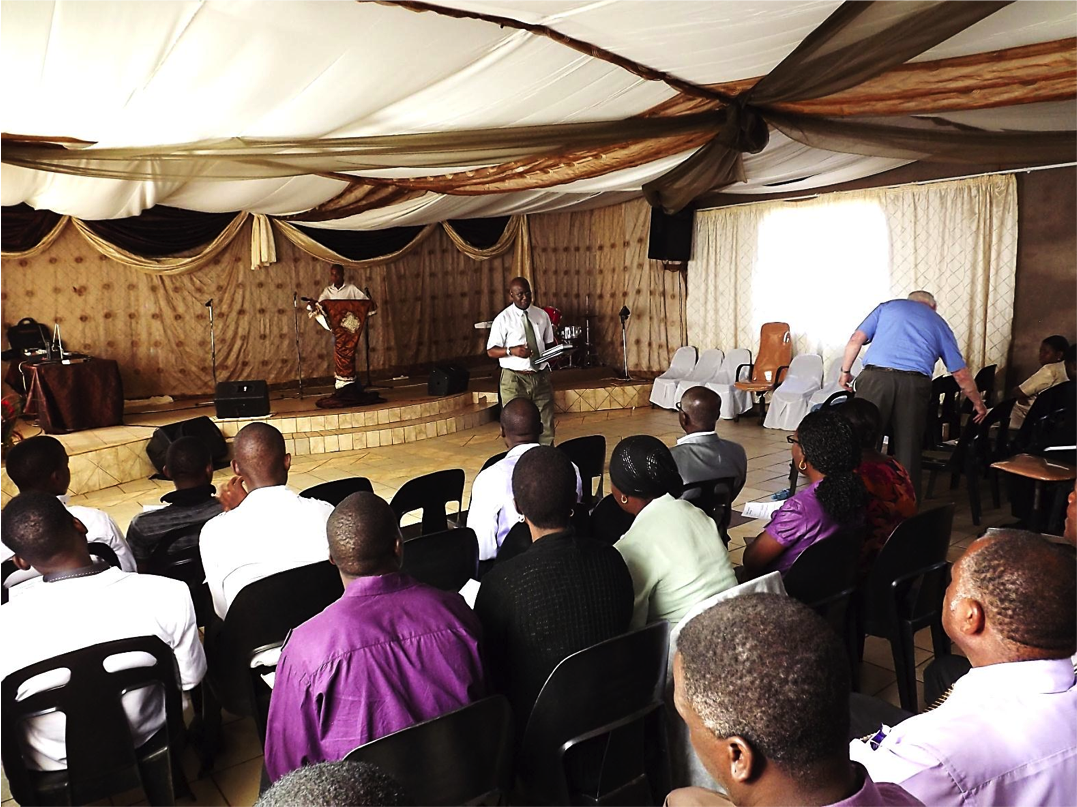[This is the second instalment in the series of blog posts in which I am answering questions posed by my Facebook "friends" who are between the ages of 15 and 25. The question below is fairly common and hence I thought of making it the second one to be answered. I trust that many young people who are considering getting into the ministry will find it helpful and that it will save them many sleepless nights!]
QUESTION: Hi Mr Mbewe, I always appreciate your ministry. I have a question and I better ask it before I turn 26 later this year. My question is: What is the best way for a young man in Africa, during a time of political and economic uncertainty, to get into ministry? Many thanks. Looking forward to listening to the G3 conference sermons when they are ready for download. (From FB)
ANSWER: My answer to your question will not really be situational. In other words, whether there was political and economic uncertainty or not, I would give the same answer. This is because the Bible only has one way in which to get into ministry and it does not depend on the circumstances in which you are. So here goes!
My first task is that of definitions. Let us make sure we are singing from the same hymn sheet. I trust that by the phrase “getting into ministry” you are speaking about becoming an ordained preacher of the Word of God. This may be either as a church-planting missionary or as a pastor of an already established church. There are many other roles one can play in fulfilling Christ’s mandate in his church, and they can loosely be called “ministry” but I will limit myself to this understanding fin answering your question.
If you are considering getting into the ministry in this sense, your first responsibility is to talk to your spiritual overseers about it. By spiritual overseers, I mean your church elders. If your church has a pastor, i.e. someone who provides overall leadership within the elders of your church and is an ordained preacher of the Word of God, then that should be the primary person you should share your desires with.
Christians are not loose individuals seeking God’s will for their lives on their own. Jesus, the great Shepherd of the sheep, has left his sheep in the hands of undershepherds in local churches. Hence, the apostle Paul urged the elders in the church in Ephesus to “pay careful attention to yourselves and to all the flock, in which the Holy Spirit has made you overseers, to care for the church of God, which he obtained with his own blood.” (Acts 20:28). Their task is to look after the sheep, including guiding them as they make such epoch-making decisions as finding their place of service in the life of the church.
It is the responsibility of your spiritual overseers to ascertain whether you truly have the basic rudiments of what it takes to become a minister of the gospel of Christ. It is also their responsibility to ensure that you are adequately trained for the task ahead, through informal and formal training. And finally, it is their responsibility to pray with you and to commend you to the work of ministry as the Lord opens doors. Even the apostle Paul, despite the peculiar way in which he got his extraordinary calling, went to those who were considered to be pillars in the church in his own day to, as it were, present his credentials (Galatians 2:1-10). They gave him the right hand of fellowship in the work of ministry and commended him to the sphere in which he went on to labour.
Finally, when people speak about the circumstances in which they live, e.g. Africa’s political and economic uncertainty, what they usually have in mind is the subject of security. In other words, should they not first have another career qualification and perhaps even a house and a hefty bank account before they enter the work of ministry so that in case things turn sour in the church they will have something to fall back on?
My answer to that question is that you should discuss that with your church overseers. It is their responsibility to guide you according to the circumstances in which you are and also according to what they know of you and your potential. As a general rule, however, those of us who are called to the preaching ministry should trust God to look after his servants. He owns the cattle upon a thousand hills. He feeds the birds of the air and clothes the lilies of the field. Surely, he cannot fail to look after those he is sending to do his work! So, I would echo the words of Jesus and say, “Seek first the kingdom of God and his righteousness, and all these things will be added to you” (Matthew 6:33).
QUESTION: Hi Mr Mbewe, I always appreciate your ministry. I have a question and I better ask it before I turn 26 later this year. My question is: What is the best way for a young man in Africa, during a time of political and economic uncertainty, to get into ministry? Many thanks. Looking forward to listening to the G3 conference sermons when they are ready for download. (From FB)
ANSWER: My answer to your question will not really be situational. In other words, whether there was political and economic uncertainty or not, I would give the same answer. This is because the Bible only has one way in which to get into ministry and it does not depend on the circumstances in which you are. So here goes!
My first task is that of definitions. Let us make sure we are singing from the same hymn sheet. I trust that by the phrase “getting into ministry” you are speaking about becoming an ordained preacher of the Word of God. This may be either as a church-planting missionary or as a pastor of an already established church. There are many other roles one can play in fulfilling Christ’s mandate in his church, and they can loosely be called “ministry” but I will limit myself to this understanding fin answering your question.
If you are considering getting into the ministry in this sense, your first responsibility is to talk to your spiritual overseers about it. By spiritual overseers, I mean your church elders. If your church has a pastor, i.e. someone who provides overall leadership within the elders of your church and is an ordained preacher of the Word of God, then that should be the primary person you should share your desires with.
Christians are not loose individuals seeking God’s will for their lives on their own. Jesus, the great Shepherd of the sheep, has left his sheep in the hands of undershepherds in local churches. Hence, the apostle Paul urged the elders in the church in Ephesus to “pay careful attention to yourselves and to all the flock, in which the Holy Spirit has made you overseers, to care for the church of God, which he obtained with his own blood.” (Acts 20:28). Their task is to look after the sheep, including guiding them as they make such epoch-making decisions as finding their place of service in the life of the church.
It is the responsibility of your spiritual overseers to ascertain whether you truly have the basic rudiments of what it takes to become a minister of the gospel of Christ. It is also their responsibility to ensure that you are adequately trained for the task ahead, through informal and formal training. And finally, it is their responsibility to pray with you and to commend you to the work of ministry as the Lord opens doors. Even the apostle Paul, despite the peculiar way in which he got his extraordinary calling, went to those who were considered to be pillars in the church in his own day to, as it were, present his credentials (Galatians 2:1-10). They gave him the right hand of fellowship in the work of ministry and commended him to the sphere in which he went on to labour.
Finally, when people speak about the circumstances in which they live, e.g. Africa’s political and economic uncertainty, what they usually have in mind is the subject of security. In other words, should they not first have another career qualification and perhaps even a house and a hefty bank account before they enter the work of ministry so that in case things turn sour in the church they will have something to fall back on?
My answer to that question is that you should discuss that with your church overseers. It is their responsibility to guide you according to the circumstances in which you are and also according to what they know of you and your potential. As a general rule, however, those of us who are called to the preaching ministry should trust God to look after his servants. He owns the cattle upon a thousand hills. He feeds the birds of the air and clothes the lilies of the field. Surely, he cannot fail to look after those he is sending to do his work! So, I would echo the words of Jesus and say, “Seek first the kingdom of God and his righteousness, and all these things will be added to you” (Matthew 6:33).








































